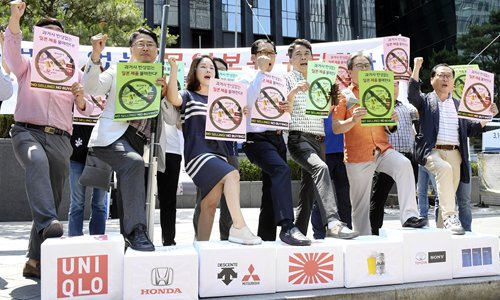HOME >> OPINION
Japan’s curbs on semiconductor material exports to S.Korea will likely worsen ties
By Chen Yang Source:Global Times Published: 2019/7/7 19:42:16

Photo: IC
Since Japan's Ministry of Economy, Trade and Industry (METI) announced on July 1 that it will tighten export controls against South Korea on three materials needed for manufacturing semiconductors for use in smartphones and televisions, the war of words between Japan and South Korea has heated up again.
The South Korean government summoned the Japanese ambassador to lodge a protest and has been preparing to file a lawsuit in keeping with WTO norms. The Japanese government has taken a firm stance and refuses to yield in the standoff. Japanese Prime Minister Shinzo Abe said on July 3 that sanctions against South Korea are "not at all in violation of the WTO."
Since Japan's announcement of tightening the leash on exports to South Korea came shortly after the G20 summit in Osaka, questions were raised about Japan's promise of promoting a "free and fair trade environment."
The three materials of which Japan has decided to curb exports to South Korea are fluorinated polyimide, photoresist and high-purity hydrogen fluoride. These account for 70 to 90 percent of the international market share. Korean companies like Samsung and LG rely heavily on these materials from Japan. The export controls will inevitably have an impact on large Korean companies.
The standoff may increase the ruling Liberal Democratic Party's chances of winning the Japanese House of Councillors election scheduled on July 21. Anti-Korean sentiment is high in Japanese society. The Abe government's decision to strengthen export controls is meant to pander to Japanese public opinion.
Japan's export curbs seem to have hit the Korean economy, but they will eventually affect the Japanese economy itself. Hence, they may not last long. Japan and South Korea are each other's third-largest trading partners, but in recent years there has been a trade deficit between the two.
Relations between Japan and South Korea haven't been smooth recently. The main cause of weaker ties is the 2018 judgment of a South Korean court on the issue of WWII forced labor by Japanese enterprises.
Afterward, issues like the South Korean government dissolving the Japan-backed Reconciliation and Healing Fund and a radar "lock on" incident involving a Japanese patrol plane and a South Korean warship stem from the forced labor issue.
The key to resolving the stalemate lies in how to deal with the court's judgment of the issue. The essence of the judgment is twofold. First is the objective treatment of history. Second, the respect for judicial verdict. If Japan can look at its history objectively, there would be no lawsuit necessitating the Korean court verdict. Both Japan and South Korea apply the separation of powers within their systems. Whether judicial decisions go with public opinion or not, both societies are known to respect court verdicts. However, some of Japan's current moves make people feel it lacks the respect for judicial decisions. Instead, it uses economic sanctions to retaliate against judicial decisions, which is regrettable.
To solve the current dispute between Japan and South Korea is to objectively treat history and honor judicial decisions. This can become the basis for improving Japan-South Korea relations.
Japan and South Korea are both important neighbors of China. Although the current dispute between Japan and South Korea is bilateral, stable Japan-South Korea relations are undoubtedly beneficial to the prosperity and stability of Northeast Asia and the Asia-Pacific region.
Looking back at China-Japan-Korea relations in recent years, we can actually find that the THAAD missile defense system issue has led to a sharp deterioration in China-South Korean relations, and then Japan's moves on historical and territorial issues have hurt ties with both neighbors.
The three countries have geographical and socio-cultural similarities but trilateral relations leave a lot to be desired. Nowadays, China-South Korea relations and China-Japan relations have improved. Now that a "black swan" incident has taken place between Japan and South Korea, it makes people feel that cooperation between China, Japan and South Korea is difficult.
The negotiations for a trilateral Free Trade Agreement (FTA) began in 2013, but have stalled from time to time due to political and diplomatic spats between the three countries. Hopefully Japan and South Korea can improve relations as soon as possible, especially in the context of the current rise of protectionism on a global scale. Improvement of Japan-South Korea relations will help talks on the China-Japan-South Korea FTA, which will account for 20 percent of global GDP and, more importantly, contribute to the positive development of regional and even international economy.
The author is an editor with the Global Times and a Japan watcher. opinion@globaltimes.com.cn
Posted in: ASIAN REVIEW